In Portland and other cities across the U.S., the cost of transit is going up. A combination of factors is making it hard for transit agencies to make financial ends meet and the result is often not just service cutbacks but fare increases as well.
This morning TriMet announced a grave warning about a $17 million budget shortfall next year and it seems very likely that yet another fare increase is on the horizon. That announcement got me thinking: Will the higher cost of bus and rail fare hasten a switch to bicycling for some riders? Has it already?
U.S. Census statistics make one thing clear: In parts of Portland where bike use is already high, the rate of bike ridership rivals transit ridership.
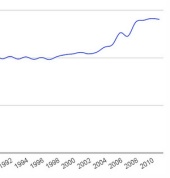
According to the U.S. Census Bureau (with analysis by the Portland Bureau of Transportation) census tracts with 8% or higher bicycle commute rate have an overall bicycle commute mode split of 13.1%. That number represents an area of the city in which about 20% of the city’s total commuters live. In that same area, 14.9% of residents commute by public transit.
Furthermore, between 1990-2008, Census data tells us that the change in daily bicycle commuters citywide has outpaced the change in daily transit commuters. The graph below was created by PBOT’s bike coordinator Roger Geller (to whom I’m leaning on considerably for this information):
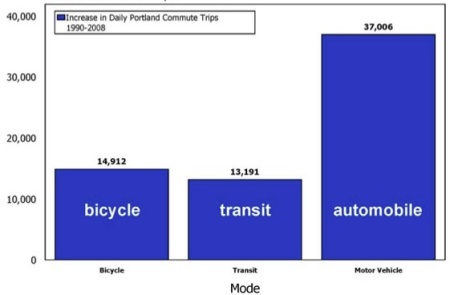
So, according to this analysis, there are clearly some forces at work that already make biking more appealing than transit for some people under some circumstances.
Unlike transit, which is increasing in cost while cutting back on service, the cost of bicycling (free) will remain unchanged while the quality of bike service continues to go up. This trend points to a future where even more people switch to bicycling at an even faster rate.
For some people, including myself, the high cost of transit is already a deterrent. A single adult fare is currently $2.40. Add my family into the mix and that’s $7.20 just to get downtown or up to Washington Park from our house in North Portland (and next year, when my other daughter turns 7, it’ll be $9.60).
When I posed this question via Twitter this morning, I heard from people in New York City — another transit-rich city where bicycling facilities are improving rapidly — that the high cost of transit is already causing people to switch to bikes.
Brooklyn Spoke wrote:
“Definitely happening in NYC. I made a complete switch for my most recent job, saved over $400 in a few months. Others in office doing same.”
And Brooklyn resident Sarah Goodyear says she’s “really starting to feel pinched” by ever-increasing MTA fares. She emailed her thoughts:
“I’ve always loved biking as a mode because of the freedom, exercise, sense of connection to the streets, speed, and reliability it affords. But I never really thought about the cost much, even when I had a much lower income than I do today.
But now, as the MTA fare keeps going up and up and up (it’s $2.25 now), and now that my kid is old enough to pay to ride, I’m really starting to feel pinched by it.”
Goodyear says she splits her daily commute into Manhattan between biking and transit and that every time she doesn’t ride her bike, not only does she miss the exercise and freedom, but, “I also really think about how it is hitting me in the pocketbook.”
Here in Portland, you can guarantee the bike service network will continue to improve each year as more bikeways are added and the price to make a bike trip will remain unchanged. The same can’t be said for our transit network.
Of course there’s also the consideration that a good transit network is key to some of the existing and potential future bike trips; but for trips of 4 miles or less, biking is a very viable, competitive — and increasingly cheaper — option.
Do you think the gloomy future of transit will have a significant impact on bicycling ridership? How about your own experience? I’d love to hear from more Portlanders about this.



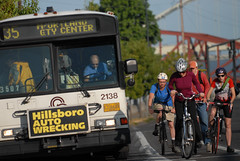
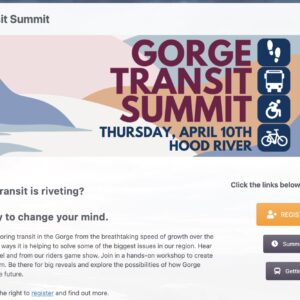
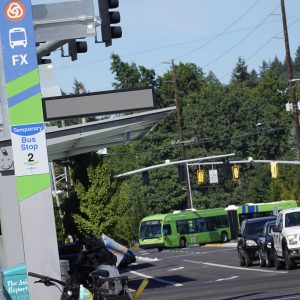
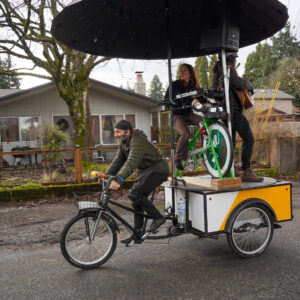
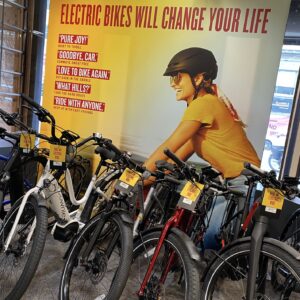
Thanks for reading.
BikePortland has served this community with independent community journalism since 2005. We rely on subscriptions from readers like you to survive. Your financial support is vital in keeping this valuable resource alive and well.
Please subscribe today to strengthen and expand our work.
Trimet has been pushing fares up almost continually for the last decade –including the “temporary” one when gas prices spiked that hasn’t been rolled back yet. There’s no doubt that the cost to ride has limited use and has hurt efforts to get people out of their cars.
The agency simply doesn’t serve the interests of everyday transit riders, a trend that has only grown over time.
The answer is to make Tri-Met a locally-elected Board, responsible to the people the agency serves, rather than a gubernatorial appointment of cronies and campaign contributors.
Many people here know this but I’m sure many do not: The legislation that created Metro empowers the Metro Board to take over Tri-Met by a simple majority vote. That action is long overdue. Metro has been unwilling to take that step, but the public needs to start demanding it if the downward spiral Tri-Met’s on is going to stop.
This is probably the worst idea I ever heard. An elected board would result in throwing more politics in the ring and getting less done. Sounds like the sad state that PDC is in given the City Council takeover a couple years back.
Democracy sucks? Hmm.
I rely on the Max to get out to Hillsboro and back each day. (Bike + Max = 1hr trip; Bike ~= 1:45hr trip) The high fares are frustrating. Almost as frustrating is how often their ticket machines and validators are broken.
To compound that frustration (high fares + poor maintenance), when I do see someone working on a trimet machine, it’s almost always one guy working and, two guys standing around doing nothing. I can understand sending 3 guys out to do a 3 man job but, if you’re looking to save a little money, how about you send 1 guy out to do a 1-man job and stop paying the other two to hang out all day.
Without the Max, I would pretty much have to drive every day and, tri-met’s poor service and high prices are making that more and more tempting.
I definitely share your frustration at faulty equipment. But reducing man power only looks good…
Until the 1 guy has to lift something > 50 pounds. Then he has to stand around for 3 hours doing nothing until they can call in some guy from another area to help him lift whatever it is. So 3 hours waiting around + several hours travel time + an extra 3 hours of downtime for the equipment.
In the end, it’s cheaper to send the additional, lower wage fng out with the master tech in the first place. Especially when you consider the lawsuit payout from the guy that says “I’m not going to wait 3 hours for someone to get here, I’ve got work to do’ WHOOPS, back injury, lawsuit, workmans comp.
OHSA rules are there for a reason. Safety first.
What is true of TriMet is/will be even more true for cars/gas prices. I realize that most of the cost of driving is fixed (purchase, insurance, maintenance) but when gas prices double again, bikes will look more tempting to those who rely on cars too.
Do we know to what extent TriMet’s fare increases are being linked to higher fuel prices?
great photo by the way, what with the Auto Wrecking billboard mounted on the underside of the bus’s bike rack 🙂
When I think about my riding my bike, I get happy. When I think about riding the bus, I get apprehensive, and sometimes despondent. I commute by bike, year round. I only use the bus when the weather (snow accumulation) makes riding impractical. But that is when Tri-Met is also at its absolute worst. Riding my bike is faster, much more fun, and gives me the flexibility to go where I want. Plus, I don’t have to wait 45 minutes for a bus that is supposed to come every 15 minutes.
I fear Tri-Met is on a downward spiral: more service cuts and higher fares mean fewer riders and lower customer satisfaction, which lead to higher fares and more service cuts. There may come a time in my life when I won’t be able to ride my bike, and if my family doesn’t follow my wishes to be immediately euthanized (sort of kidding), I could end up relying on our transit system. The rail options will probably be fairly good, but buses will suck — high fares, low level of service, and subject to the same traffic delays as cars.
If public transit were free, I’d still choose to cycle (for all the reasons Sarah Goodyear gave), but I expect you’re correct – in fair weather at any rate.
However it is incorrect to say that the cost of bicycling is free. Aside from the initial cost of a good quality commuter bike (with fenders, racks and/or baskets, panniers & a lighting system). there’s, rain gear, maintenance, replacement brake pads, tires etc…
When the weather is really bad, I sometimes consider riding the bus, but they”re so crowded (so much so that I’m told they often won’t even stop to pick you up), that I generally choose to ride or walk.
As well as Roger’s excellent list of why cycling isn’t free (low cost compared to everything else, but still not free), there’s the cost of food. As a friend of mine so cheerily said (when he was riding over the Sylvan Hill twice a day)… “what I don’t spend for gas, now goes for food!”
You also have opportunity costs for time spent cycling.
There is an “opportunity cost” in economic terms if and only if there is something the commuter would rather be doing with his or her time. Personally, I’d like to have MORE time for cycling, so the ability to use my commute time to ride my bike is a net benefit, not a cost.
And the fact that many times transit can cost you more time during your commute than riding can.
Not always. I find that cycling the 12 miles home from work is about a 15 minute difference if I take my car to work. Taking transit is about the same time as bike.
Any physician is going to recommend at least 30 minutes of exercise a day. By cycling home from work (I do take MAX in the morning part way since I have no access to a shower at work), I am getting the exercise part out of the way by simply just getting myself home.
I also do a multi-mode bike-MAX-bike commute (1h) or a straight bike commute (1h 15min), and it’s getting harder to justify the transit cost, even with my employer’s partial transit subsidy.
It would help if the pricing structure for passes was a bit more realistic. If I’m only using transit for my commute it’s cheaper for me to use 2h tickets than any of the passes. I just ran the numbers, and my best estimates (for a 52 week year, doing my best to not pay for transit during 3 weeks of vacation) for annual pre-subsidy costs are:
2h tickets: $936 (390 of ’em)
daily passes: $975 (+4.2%) (195 of ’em)
14-day passes: $1162.50 (+24.2%) (25 of ’em)
monthly passes: $1036 (+10.7%) (11 of ’em plus a week of 2h tix)
yearly pass: $1036 (+10.7%) (includes $24 S+H)
The % changes are even more extreme once I take into account my employer’s flat $ amount per month subsidy.
Trimet needs a monthly weekday (customizable for your work week would be great too!) pass that gives a similar discount vs. dailies similar to that of the monthly. That would go a long way to getting more people to use transit for commuting and help counterbalance the wretched performance of the universally despised platform ticket machines.
amen. when i did the math, i was really surprised. i don’t qualify for any transit subsidies, but i did ask for 100 max tickets for christmas. i’m crossing my fingers!
I tried tri-met after a recent office move from Lake Oswego to South waterfront in May. It seemed so perfect at first. I basically get door-to-door service, by bus, from home to the office. No transfers required, and my employer pays for the entire amount of a yearly tri-met pass… However, I quit almost immediately and switched to biking once I realized that by the time I got home on my bike I would still be sitting on the bus like a sardine somewhere downtown, or maybe Rose Quarter on a good day. I haven’t looked back since. I’m in so much better shape, I’ve lost 10 pounds, I eat better, way less stressed, and I feel my quality of life has vastly improved. My recommendation, lube your chain, and ditch tri-met!
Place realistic cost per mile fees on private auto use.
Remove unequal subsidies for petrochemical fuels.
Allow market to correct itself.
Surprise! There is a demand and funding for mass transit.
I’d like to know how many of those who say they prefer to ride their bike than take transit, no matter what:
–are under 60;
–live close enough to work/school/groceries/social and medical support systems to avoid needing transit or other motorized transport;
–are not living with a disability that makes biking and walking difficult or impossible.
The failure of transit in Portland is not something any of us should sniff at.
Portland’s population may be skewed younger but the fact is that we’re all still getting older. The first Baby Boomers are hitting retirement age, and the youngest are pushing fifty.
Speaking as someone who enjoys good health and can ride a bike almost everywhere I need to go, I am amazed at the level of age denial I see in some of these responses.
Youth and excellent health don’t last forever, for most of us. As the overall population gets older and slower, more of us will need motorized transport of some kind to get us to the places and people we need in our lives.
If we don’t address transit funding and other issues now, then when all those now-younger folks live too far from what they need (or are too old to ride everywhere — it will happen someday!) we won’t have much of a transit system left to serve the expected upswing in population who will need it.
Dismissing transit as something that isn’t relevant today is short-sighted and dumb.
I’m scrolling through these comments, searching in vain for anyone dismissing transit as irrelevant. My post certainly doesn’t say anything of the kind, and I don’t see anyone else saying it either. What I see are some very cogent and constructive critiques of Tri-Met.
full disclosure: I’m under 60 (for another week), I’m relatively healthy (which I attribute to my decision at age 15 to be car-free and using bicycles as my primary mode of transportation since childhood). I’m pro public transportation and will purchase a monthly pass when I become an “honored” citizen (and use it in combo with walking & cycling). I’m thrilled that Tri-Met is building a MAX line near my SE home and a new bridge across the river. I will no doubt have electric assist installed on one of my bikes someday.
I have always tried to live within reasonable cycling distance from the places that I frequent, which is why I decided to buy a considerably more expensive house near Peoples’ Food Coop than one in Lents. I appreciate that not everyone can afford such a convenient location and they deserve and need safe, reliable and affordable public transportation.
In order for public transit to work for more people, the service needs to be better, not diminishing. In Mexico, Turkey and other countries that I have visited there are smaller buses which run frequently, which seems like a simple way to provide service late at night &/or in less populated areas.
public transit is important, but the ability to recognize that very nearly all of us could bike for most of our transportation needs is even more important.
We don’t have to be a Dave Weber, nor are very many of us in Brian Willson’s position of cycling without legs. Distances and physical impairments are not the main impediments here, folks. What is in the way is what we are used to and comfortable with, and what we can imagine ourselves to be capable of. The sooner we (who aren’t yet biking regularly) overcome those inhibitions the better for all of us, I say.
I dunno. Every mode has it’s advantages and disadvantages. Compared to owning a car Trimet is a real bargain. If you bought all zone passes monthly it comes out to 1100/yr. AAA estimates over 9k+ per year for a car*, yet it is the biggest mode share by far. I think the biggest thing they should do is reward frequent users better with a customizable pass as suggested above. I ride my bike nearly every day, but I love Trimet and glad it is available. It’s cleaner and better thought out than any other transit in the US.
* http://latimesblogs.latimes.com/money_co/2010/04/aaa-the-price-of-owning-a-car-any-car-rose-over-the-last-year.html
That AAA stat is an average. I get by perfectly fine on less than $1500/yr for my car (I commute to work by bike and only use the car occasionally). I easily spend more than that on bikes (granted most of those expenses are for racing and training, not commuting).
Pretty sad that many Portlanders already pay more for transit than the folks in NYC…
For me it wasn’t fare hikes that got me to switch from bus to bike but service cuts. I thought I’d go back to the bus when it started to rain, but found out I got just as wet walking to and from the bus stops as biking.
Remember that TriMet is funded largely by payroll taxes.
If payrolls are down, so is its funding.
If our government wasn’t throwing so much money away down the rathole of foreign wars, there might be some more money locally for transit systems.
Don’t forget bailing out car companies and greedy banks.
TriMet also continues to throw money away locally on the Streetcar system, at the expense of bus service and fares.
Are you talking about the Streetcar or MAX? The Streetcar is owned and operated by the City of Portland.
I started out biking in Portland as a way to avoid a bus transfer. Now, after losing a bunch of weight, I bike the entire way to work from home. So yes, I think the upcoming budget woes will put more people on bikes.
There was a story some months back about one city (in the south, I think) whose mayor wanted to make all transit FREE as a response to the recession, with the idea that a fully subsidized public transit system would provided a major economic boost by mobilizing citizens, making it easier to look for a job and to get back and forth to it.
Now, for the life of me I can’t find that story. Anyone have a link?
No one recalls?
I don’t think its a coincidence that biking has increased while the transit system has expanded and ridership has grown (even though fares have increased). Regardless of what your preference is, having both options available allows you to be less reliant on your car; I wouldn’t want the price of more bike trips to be more car dependence.
This year I started to commute to and from work by bike (16 miles round trip, 1200 miles this summer). I am now moving to an area where I feel safe riding year round. With the money I save by not riding Tri-met, I figure good rain gear will pay for itself in 2 months.
Do you spend more time cycling than you did on transit?
Time wise, it is about the same. 15 minute walk to MAX, 25 minute ride to work. 40-45 minute bike commute.
(from a 75 yr.old retiree): The service reductions play a big part too. My volunteering twice a week requires me to travel (one way) either 1.7mi by bus+.6mi walk or 2.2 mi by bike; 5 years ago, the buses came every 12 min, now they come every 20 min. 5 yrs ago, I mostly used the bus, now I mostly bike. I also go to a lot of concerts and such downtown evenings; they get out at about 10 pm. 5 years ago, buses home came every 15 min, now they come every 40 min. That has led me to learn to drive from SE to across the river and to learn where to park, so now I drive where I used to be a happily virtuous transit rider. I still get a monthly pass, even though it’s not cost-effective, because I think it is a civic duty to support public transit. I don’t know how long it’ll be before I decide that we don’t have a viable transit system to support.
To add a little to this, there are a lot of flights that come in just around midnight at PDX. I had one of those flights once and I was getting off the plane abuot the same time the last train was scheduled to leave. Thankfully, I had someone give me a ride. But, I never understood this.
C-tran in Vancouver, Wa is also facing similar woes. Check out the new ballot measure:
http://www.c-tran.com/ballot_measure.html
If it doesn’t go through, a system wide service reduction of 35% will be implemented by 2013.
In many cases (including mine — I work in Beaverton, 12+ miles and over the West Hills from home) it is the combination of transit and biking that makes it possible to leave the car at home. Even those who don’t do multimodal commutes may take transit one day and bike the next. If transit takes a hit, so may cycling.
And that’s too bad. Transit may seem expensive, but the average driver spends $15-30 per hour to operate their car.
A couple extra quarters for a ride and no cost to park is still a great deal by my account. Transit can save about $10k a year over owning, maintaining, running, and parking a car. If you have to take transit to get anywhere, then you’re probably living in the wrong place. Most people only need it to get to work or an occasional here or there, so a nickel extra every year seems insignificant. I think this story is a bit overblown.
If people are concerned about the cost of transit, maybe they should consider that the unions that operate transit expect (and often get) free, diamond-studded health care and constant pay increases. That would be the first place I’d go to get fares back in line. Also, the cities should do more to give transit it’s own traffic lane in key places to minimize the excessive delay that keeps raises operating costs.
I’m a split mode commuter: MAX from Sunset to PGE Park, bike to NW Front Ave. When I’m feeling manly I’ll ride the whole way up and over Sylvan. Although in the rainy/dark winter months the ride through Wash. Park is frightening since there are no street lights. Luckily I get the benefit of my employer paying 50% of my Trimet costs each month.
It would be helpful if Portland Streetcar, Inc., would acknowledge our public records and public meetings law, so media and citizenry understand just what it is costing us and where its funding comes from.
IMO-Bicycling is the future, along with scooters and high mileage smart cars.
Transit is a miserable failure in the USA and its future is bleak indeed.
Minor quibble: The cost of bicycling may be minimal, but is not free.
I ride my bike (xtracycle) with my daughter to the bus so we can catch a bus ride up Vista (long hill). While I agree that fare increases are never nice, I also think this conversation has ignored that for transit to thrive, it HAS to capture people that would otherwise drive–the costs associated with a daily drive (forgetting the annualized costs of car ownership as many people would pay that anyway because they use the car for other trips) can be staggering, but most people only see it bit by bit. A tank of gas here, a tank of gas there, a meter fee there, a ticket here… TriMet should be actively promoting the extreme bargain transit is compared to a car. If every biker in this city starting riding trimet, the people driving in their cars would still clog the streets, contribute emissions, and represent the biggest POTENTIAL ride shift out there.
I consider myself very lucky as my employer pays for my trimet pass. I am able to bike downtown (it is faster to do that) and catch MAX to go up the hill. And, both home and work a less than a half mile from a MAX stop.
However, before I got this job, I worked at a place nearby and had to pay for a one way trip. The price of paying for a single ride ticket got to be expensive. And, the distance was too far and the terrain was too steep and I had no access to a shower when I got to work. Going home was not really an issue and have always just pedaled home unless the forecast was wrong and didn’t have my rain gear or rain bike.
If I didn’t get to ride as part of my benefits, it may be a tough call for me to spend all the money.
One of the things I have wondered, though is if we could get the price of the tickets down if Trimet did a better job of enforcing the fares. I started full time at this job in February and have taken MAX generally 4x a week (either nothing but MAX or MAX/bike) and I have yet to get hit up by a fare inspector.